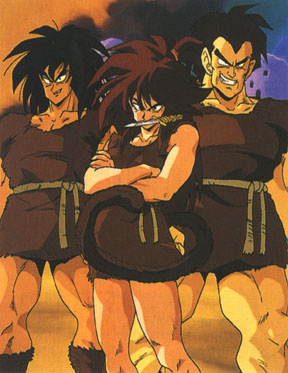Saiyans
m |
Darth Batrus (Talk | contribs) m (→Comments) |
||
| Line 13: | Line 13: | ||
As an in-joke, [[Akira Toriyama]] based all the Saiyans' names on various vegetables, and the species name comes from an anagram of "yasai," Japanese for vegetable. | As an in-joke, [[Akira Toriyama]] based all the Saiyans' names on various vegetables, and the species name comes from an anagram of "yasai," Japanese for vegetable. | ||
| + | [[Category:Species]] | ||
| + | [[Category:Warrior races]] | ||
[[Category:Dragon Ball]] | [[Category:Dragon Ball]] | ||
[[Category:Dragon Ball (Movies)]] | [[Category:Dragon Ball (Movies)]] | ||
| − | |||
Revision as of 11:47, 9 November 2007
The Saiyans are a race of humanoid aliens whose homeworld was Planet Vegeta. A warrior race, Saiyans have formidable combat skills and an innate proficiency in the use of ki energy. Additionally, Saiyans come out of every battle stronger, especially after healing from grievous wounds. They also possess monkey-like tails, which enable them to transform into the mighty Oozaru beneath the rays of a full moon.
The Saiyans came to rule their planet by exterminating a competitor species, the Tuffles, and stealing their technology- most notably the scouters. The Saiyans eventually fell under the domination of Frieza, who used them as some of his best mercenaries. They took advantage of their alliance with Frieza, exchanging technologies and shipping their weaker children to unknown planets, using them as advance forces for future conquests.
However, when Frieza realized that the Saiyans' growing strength could one day challenge him, he resolved to destroy the Saiyans. Despite the efforts of Vegeta's father King Vegeta and Goku's father Bardock, Frieza was able to use his Death Ball technique to obliterate Planet Vegeta. Of the entire race, only a handful remained, most in Frieza's employ: Vegeta, Nappa, Raditz and Kakarot (Goku).
Movies
The films also included Paragus and his son Broly, as well as Turles.
Comments
As an in-joke, Akira Toriyama based all the Saiyans' names on various vegetables, and the species name comes from an anagram of "yasai," Japanese for vegetable.
